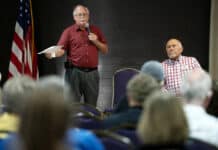The city of Sedona has unilaterally revoked all temporary use permits for events for the next eight weeks, including many private events taking place on private property but requiring a public permit, and some not scheduled until as late as May.
“The [Centers For Disease Control and Prevention] has issued guidance that all events with an anticipated attendance in excess of 50 people be cancelled for the next eight weeks at a minimum,” Sedona Assistant City Manager Karen Osburn wrote. “Furthermore, the CDC is making recommendations instructing people to avoid congregating and practice ‘social distancing.’ The city is cancelling all events in which we expect more that 50 people and many with less at city-owned facilities.”
“In light of wanting to adhere to this guidance, and our own cancellations of city events, it would be contrary [for the city] to issue permits for others to hold events that would attract potentially more than 50 people,” she stated.
Some temporary permit holders provided copies of their permits to the Sedona Red Rock News. The permits list nearly 20 conditions of approval, none of which include specific maximum attendance limits. Expected crowd sizes are also not in the canceled permits.
When asked what authority the city has to cancel approved permits without discussion or warning, Osburn wrote, “The [Land Development Code] gives us the authority (8.4(D)(3)(d)(4)) to revoke a TUP for failure to comply with the conditions of approval.”
That LDC section reads, “A temporary use may be approved subject to conditions of approval. Upon failure to comply with conditions, a temporary use permit may be suspended or revoked automatically, and the permit holder may be subject to code enforcement action pursuant to Section 1.7, Enforcement. If a temporary use permit is suspended or revoked, the director has the authority to refuse to accept another application for a temporary use permit for the same or substantially the same use within one year from the date the temporary use permit application was filed.”
“A condition of approval for all of the TUPs is that activities associated with the events must ensure compliance with all temporary use requirements of LDC Section 3.5,” Osburn wrote. “The first requirement is that the temporary use shall not be detrimental to the public health, safety or general welfare.
“At this point, given the CDC guidance for the pandemic, the president-issued stricter guidance and the precedent being set all over the state and country with closures of all kinds and suspensions of public gatherings — in some cases not allowing people to leave their homes — none of these events can comply with that requirement.”
However, public gatherings have not been suspended in Arizona and no Arizona government has prohibited people from leaving their homes.
“If the city is aware of the pandemic and federal and state guidance about public gatherings, and fails to reverse course on the issuance of those permits, essentially the city would be sanctioning the event to take place and risking people’s health and well-being,” Osburn wrote.
“If we can simply suspended the TUP and avoid the large congregation of people and the possible spread of the disease, we prefer to err on the side of public health and safety.”
“I was actually unaware that we had any organizers of these local events that still desired to proceed, given what we are being told from federal and state authorities about the seriousness of this pandemic, the need for social distancing and how dangerous gatherings like this can be,” Osburn wrote.
However, multiple event organizers who contacted the NEWS about their events being canceled said that given that their events are still two months away, they were still planning on hosting them.
Osburn added, “Finally, revocations of special use event permits do not prohibit people from free assembly,” which is a constitutional right protected by the First Amendment. “They prohibit organizing a special event that would otherwise require a permit from the city.”
At 9 a.m. on March 17, the city announced it would be imposing a state of emergency.
“To be proactive and precautionary regarding the potential effects of COVID-19, on Tuesday, March 17, city of Sedona Mayor Sandy Moriarty declared a state of emergency,” Communications and Public Relations Manager Lauren Browne wrote. “This is a routine measure meant to ensure the city can be nimble in the response to COVID-19 and dedicate the resources to take whatever actions are deemed necessary in this rapidly evolving situation.”
City staff did not indicate what made the emergency measure “routine.”
“No decisions have been made on business closures but those, and other actions, will be discussed in the coming days in these unprecedented times,” Browne wrote. “The city is in frequent contact with Coconino and Yavapai counties and their epidemiologists, emergency response teams and policy leaders, health care professionals and other stakeholders to monitor the situation daily.”
The emergency order, signed by Moriarty and Sedona City Attorney Robert Pickels, cited its authority to impose the order under the wrong Arizona state law, Arizona Revised Statute §23.311, which lists definitions about minimum wage and mentions nothing about emergency declarations.
At 11:03 a.m., Pickels wrote, “This was a typo that needs to be corrected. The reference should have been to ARS §26-311.”
By press time, a corrected order had not been issued.






















